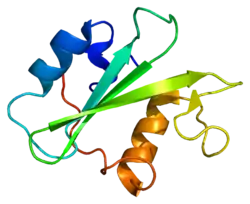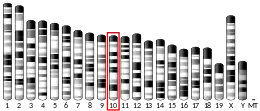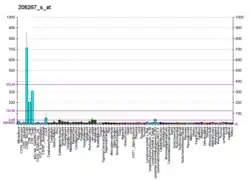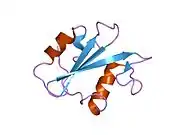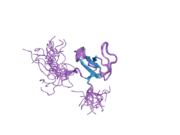Megakaryocyte-associated tyrosine kinase
Megakaryocyte-associated tyrosine-protein kinase is an enzyme that in humans is encoded by the MATK gene.[5][6][7]
The protein encoded by this gene has amino acid sequence similarity to Csk tyrosine kinase and has the structural features of the CSK subfamily: SRC homology SH2 and SH3 domains, a catalytic domain, a unique N terminus, lack of myristylation signals, lack of a negative regulatory phosphorylation site, and lack of an autophosphorylation site. This protein is thought to play a significant role in the signal transduction of hematopoietic cells. It is able to phosphorylate and inactivate Src family kinases, and may play an inhibitory role in the control of T-cell proliferation. This protein might be involved in signaling in some cases of breast cancer. Three alternatively spliced transcript variants that encode different isoforms have been described for this gene.[7]
Interactions
Megakaryocyte-associated tyrosine kinase has been shown to interact with CD117[8][9] and TrkA.[10]
References
- GRCh38: Ensembl release 89: ENSG00000007264 - Ensembl, May 2017
- GRCm38: Ensembl release 89: ENSMUSG00000004933 - Ensembl, May 2017
- "Human PubMed Reference:". National Center for Biotechnology Information, U.S. National Library of Medicine.
- "Mouse PubMed Reference:". National Center for Biotechnology Information, U.S. National Library of Medicine.
- Bennett BD, Cowley S, Jiang S, London R, Deng B, Grabarek J, Groopman JE, Goeddel DV, Avraham H (February 1994). "Identification and characterization of a novel tyrosine kinase from megakaryocytes". J Biol Chem. 269 (2): 1068–74. PMID 8288563.
- Avraham S, Jiang S, Ota S, Fu Y, Deng B, Dowler LL, White RA, Avraham H (February 1995). "Structural and functional studies of the intracellular tyrosine kinase MATK gene and its translated product". J Biol Chem. 270 (4): 1833–42. doi:10.1074/jbc.270.4.1833. PMID 7530249.
- "Entrez Gene: MATK megakaryocyte-associated tyrosine kinase".
- Jhun, B H; Rivnay B; Price D; Avraham H (April 1995). "The MATK tyrosine kinase interacts in a specific and SH2-dependent manner with c-Kit". J. Biol. Chem. UNITED STATES. 270 (16): 9661–6. doi:10.1074/jbc.270.16.9661. ISSN 0021-9258. PMID 7536744.
- Price, D J; Rivnay B; Fu Y; Jiang S; Avraham S; Avraham H (February 1997). "Direct association of Csk homologous kinase (CHK) with the diphosphorylated site Tyr568/570 of the activated c-KIT in megakaryocytes". J. Biol. Chem. UNITED STATES. 272 (9): 5915–20. doi:10.1074/jbc.272.9.5915. ISSN 0021-9258. PMID 9038210.
- Yamashita, H; Avraham S; Jiang S; Dikic I; Avraham H (May 1999). "The Csk homologous kinase associates with TrkA receptors and is involved in neurite outgrowth of PC12 cells". J. Biol. Chem. UNITED STATES. 274 (21): 15059–65. doi:10.1074/jbc.274.21.15059. ISSN 0021-9258. PMID 10329710.
Further reading
- Okada M, Nada S, Yamanashi Y, et al. (1992). "CSK: a protein-tyrosine kinase involved in regulation of src family kinases". J. Biol. Chem. 266 (36): 24249–52. PMID 1722201.
- McVicar DW, Lal BK, Lloyd A, et al. (1994). "Molecular cloning of lsk, a carboxyl-terminal src kinase (csk) related gene, expressed in leukocytes". Oncogene. 9 (7): 2037–44. PMID 7516063.
- Jhun BH, Rivnay B, Price D, Avraham H (1995). "The MATK tyrosine kinase interacts in a specific and SH2-dependent manner with c-Kit". J. Biol. Chem. 270 (16): 9661–6. doi:10.1074/jbc.270.16.9661. PMID 7536744.
- Hamaguchi I, Iwama A, Yamaguchi N, et al. (1994). "Characterization of mouse non-receptor tyrosine kinase gene, HYL". Oncogene. 9 (11): 3371–4. PMID 7936664.
- Maruyama K, Sugano S (1994). "Oligo-capping: a simple method to replace the cap structure of eukaryotic mRNAs with oligoribonucleotides". Gene. 138 (1–2): 171–4. doi:10.1016/0378-1119(94)90802-8. PMID 8125298.
- Sakano S, Iwama A, Inazawa J, et al. (1994). "Molecular cloning of a novel non-receptor tyrosine kinase, HYL (hematopoietic consensus tyrosine-lacking kinase)". Oncogene. 9 (4): 1155–61. PMID 8134117.
- Zrihan-Licht S, Lim J, Keydar I, et al. (1997). "Association of csk-homologous kinase (CHK) (formerly MATK) with HER-2/ErbB-2 in breast cancer cells". J. Biol. Chem. 272 (3): 1856–63. doi:10.1074/jbc.272.3.1856. PMID 8999872.
- Price DJ, Rivnay B, Fu Y, et al. (1997). "Direct association of Csk homologous kinase (CHK) with the diphosphorylated site Tyr568/570 of the activated c-KIT in megakaryocytes". J. Biol. Chem. 272 (9): 5915–20. doi:10.1074/jbc.272.9.5915. PMID 9038210.
- Hirao A, Hamaguchi I, Suda T, Yamaguchi N (1997). "Translocation of the Csk homologous kinase (Chk/Hyl) controls activity of CD36-anchored Lyn tyrosine kinase in thrombin-stimulated platelets". EMBO J. 16 (9): 2342–51. doi:10.1093/emboj/16.9.2342. PMC 1169835. PMID 9171348.
- Grgurevich S, Linnekin D, Musso T, et al. (1997). "The Csk-like proteins Lsk, Hyl, and Matk represent the same Csk homologous kinase (Chk) and are regulated by stem cell factor in the megakaryoblastic cell line MO7e". Growth Factors. 14 (2–3): 103–15. doi:10.3109/08977199709021514. PMID 9255603.
- Suzuki Y, Yoshitomo-Nakagawa K, Maruyama K, et al. (1997). "Construction and characterization of a full length-enriched and a 5'-end-enriched cDNA library". Gene. 200 (1–2): 149–56. doi:10.1016/S0378-1119(97)00411-3. PMID 9373149.
- Grgurevich S, Mikhael A, McVicar DW (1999). "The Csk homologous kinase, Chk, binds tyrosine phosphorylated paxillin in human blastic T cells". Biochem. Biophys. Res. Commun. 256 (3): 668–75. doi:10.1006/bbrc.1999.0398. PMID 10080957.
- Yamashita H, Avraham S, Jiang S, et al. (1999). "The Csk homologous kinase associates with TrkA receptors and is involved in neurite outgrowth of PC12 cells". J. Biol. Chem. 274 (21): 15059–65. doi:10.1074/jbc.274.21.15059. PMID 10329710.
- McShan GD, Zagozdzon R, Park SY, et al. (2002). "Csk homologous kinase associates with RAFTK/Pyk2 in breast cancer cells and negatively regulates its activation and breast cancer cell migration". Int. J. Oncol. 21 (1): 197–205. doi:10.3892/ijo.21.1.197. PMID 12063569.
- Kim S, Zagozdzon R, Meisler A, et al. (2002). "Csk homologous kinase (CHK) and ErbB-2 interactions are directly coupled with CHK negative growth regulatory function in breast cancer". J. Biol. Chem. 277 (39): 36465–70. doi:10.1074/jbc.M206018200. PMID 12122014.
- Zagozdzon R, Bougeret C, Fu Y, Avraham HK (2003). "Overexpression of the Csk homologous kinase facilitates phosphorylation of Akt/PKB in MCF-7 cells". Int. J. Oncol. 21 (6): 1347–52. doi:10.3892/ijo.21.6.1347. PMID 12429987.
- Strausberg RL, Feingold EA, Grouse LH, et al. (2003). "Generation and initial analysis of more than 15,000 full-length human and mouse cDNA sequences". Proc. Natl. Acad. Sci. U.S.A. 99 (26): 16899–903. Bibcode:2002PNAS...9916899M. doi:10.1073/pnas.242603899. PMC 139241. PMID 12477932.
- Mikkola ET, Bergman M (2003). "Conserved hydrophobicity in the SH2-kinase linker is required for catalytic activity of Csk and CHK". FEBS Lett. 544 (1–3): 11–4. doi:10.1016/S0014-5793(03)00405-8. PMID 12782282. S2CID 2653632.
